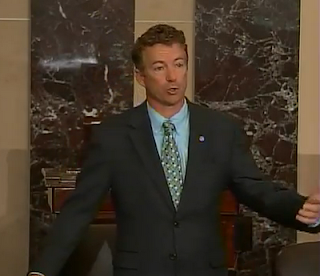 |
| Another triumph courtesy of Washington’s Foreign Aid Program. |
Kentucky Republican Senator Rand Paul is flogging what he considers to be a brilliant idea: He suggests that the federal government should take “half of the $4 billion that we’re squandering” on foreign aid “to people who don’t like us … and put it towards the deficit, and take half of that aid and put it into Veterans Benefits.”
His father had a much better idea: Since foreign aid is immoral, illegal, and unconstitutional, all of it should be ended immediately.
In a September 13 floor speech, Senator Paul addressed criticism from South Carolina Republican Senator Lindsey Graham that cutting off subsidies would be tantamount to reckless disengagement from Pakistan, which has a nuclear arsenal.
“I’m not saying don’t have relations with Pakistan,” Senator Paul insisted. “I’m not saying [to] disengage. I’m saying you don’t have to bribe people to be your friend.” Besides, he pointed out, the federal government doesn’t “have the money anyway. We have to borrow money from China to send it to Pakistan.”
What the senator describes could be called the Timon of Athens Doctrine of International Diplomacy, named after the tragic Shakespearean character who bankrupted himself in any attempt to purchase the superficial friendship of cynical people. He failed to explain why “we” (meaning the government that impudently presumes to act in our name) should be sending borrowed money to ruling elites in any foreign country – whether Pakistan, Egypt, Libya, Jordan, or Israel.
Furthermore, within a few paragraphs Senator Paul obliquely endorsed what he had explicitly disavowed. Criticizing the torpid and indifferent reaction of the Egyptian government when mobs stormed the U.S. embassy in Cairo, Paul the Younger declared that “Egypt needs to act like our ally if they want to continue to cash our checks.”
Oh, what the heck – let’s just abandon the pretense that bribery is a bad thing:
“My position is not one penny more for Libya or Egypt or Pakistan until they act like our allies,” Paul summarized. “Some say we’ve got to keep sending it. Fine. Let’s send it when they act like our allies. Let send it when they start behaving like civilized nations and come to their senses” – that is, when their rulers dutifully display the purchased “loyalty” Washington expects from its satraps.
In the meantime, insists Senator Paul – the supposed champion of austerity and paladin of constitutionalism – the borrowed money not sent to Islamabad or Tripoli should be used to “triple the size of the veterans jobs bill.” Nothing in the (admittedly flawed and inadequate) United States Constitution authorizes a federal “jobs” program of any kind. This is something Rand Paul should have learned at the dinner table. I believe that this intellectual delinquency reflects the willful foolishness of the pupil, rather than an inadequacy on the part of the teacher.
Nothing of substance will come of Senator Paul’s proposed amendment. His posture on this subject – in essence, he’s proposing to “mend, not end” an entitlement program — displays a gift for political “triangulation” that is “Clintonesque.” The rhetorically invigorating way he has presented a completely empty proposal could properly be described as “Reaganesque.” Neither of those adjectives is intended as a compliment.
According to Glenn Beck, the War Party’s Pagliaccio, Rand Paul is “the libertarian of my dreams.” Kentucky’s junior senator has made his peace with the Empire, and is willing to offer the pinch of incense that his irritatingly principled father withheld. He is likewise willing to mouth the kinds of prescribed imperial pieties – about foreign aid and foreign policy in general – that his father wouldn’t have uttered with a gun to his head.
Foreign aid, Rand’s father liked to point out, consists of stealing money from poor people in the United States and lavishing it on politically-connected wealthy elites abroad. It is one of the Empire’s most important instruments of international social engineering. This was explained to me by former World Bank chief Barber Conable during the 1995 International Development Conference in Washington, D.C. – an event that gathered thousands of lobbyists on behalf of the parasitic interests that benefit from foreign aid.
Taking what proved to be entirely unwarranted alarm over the “Contract With America” -era Republican takeover of Congress, the foreign aid lobby was concerned that the subsidies would dry up. In one of the event’s most important speeches, Conable assured them that the GOP would abide by the “bipartisan foreign policy consensus” and preserve foreign aid.
Following Conable’s speech, I handed him my business card and asked him a question: Since the Constitution doesn’t authorize the federal government to take tax dollars from American citizens and disburse them as foreign aid, how can the practice be justified?
Conable dismissed the constitutional argument as “specious.” Foreign aid is justified, he explained, because it “has to do with our position in the world. There are all kinds of ways of dealing with the problems of our relationships with the rest of the world. One is to do it the most extreme way, using national defense as your ultimate weapon. Of course, the other way is to find ways of anticipating that, and avoiding the necessity of it” through the use of foreign aid.
“So what you’re telling me is that we have the choice of either bribing them, or bombing them,” I said in search of clarification. Conable treated me to a disdainful smirk and directed his attention elsewhere.
The “Bribe ‘em or Bomb ‘em” formula is set out with more detail in John Perkins’s controversial book Confessions of an Economic Hit Man, in which the author recounted the role played by the World Bank in what he described as a global loan-sharking scheme.
Covertly recruited as an intelligence asset in the late 1960s, Perkins was dispatched to various countries, including Indonesia and Panama, to help induce their ruling elites to take out huge World Bank loans to fund mammoth infrastructure programs. In essence, he working the same scam – on a global scale – that was used by debt-peddlers during the real estate bubble: Offering extravagant loans, on what appeared to be concessionary terms, to people with a very high time preference and little interest in reading the fine print.
According to Perkins, he was just one Economic Hit Man (EHM) among thousands plying the same trade worldwide.
If an EHM is successful, writes Perkins, “the [World Bank] loans are so large that the debtor is forced to default on its payments after a few years. When this happens, then like the Mafia we demand our pound of flesh. This often includes one or more of the following: control over United Nations votes, the
installation of military bases, or access to precious resources. Of course, the debtor still owes us money — and another country is added to our global empire.”
Or, as Rand Paul would put it, another ruling elite would be expected to “act like an ally” as a condition of “cashing our checks.”
Economic Hit Men aren’t the only weapons in the Power Elite’s arsenal.
Perkins also refers to “Jackals,” who are sent to deal with the most
refractory foreign leaders by fomenting revolutions, or staging
assassinations. If that doesn’t work, as Barber Conable might say, it’s
time to send out the bombers. “When the Jackals fail,” Perkins warns, “young Americans are sent in to kill and die.”
That formula was followed precisely in Iraq and Libya during the past decade. On the pretense of fighting the “war on terror,” or carrying out a “responsibility to protect,” despots who were once considered dutiful, check-cashing “allies” were removed, wars were fomented, and the countries they had ruled were bathed in blood.
The use of money to foment war and hatred is another element of the Timon of Athens doctrine.
In the play, Timon – after exhausting his fortune – declares himself a misanthrope and retreats into the wilderness, where he finds a huge treasure. Word of this discovery is carried to Athens, which is riven with factional strife because of the banishment of a popular general named Alcibiades.
Timon is pestered by the exiled general, several prostitutes, and by emissaries from the Athenian assembly, all of whom are seeking access to his treasure. Desiring only to be left alone, Timon does the one thing he knows will inflict death and terror on the city he has come to despise: He gives away his entire treasure by funding both sides of the impending civil war — and also lavishing a bounty on the prostitutes to spread disease through the city.
Were he alive today, Timon would make a splendid Secretary of State – or CIA Director. Or he might find himself among the Party-provided image-molders and message-massagers who advise Rand Paul.
The influence of those people can be detected anytime Senator Paul decants sophistries such as this: “Let’s memorialize those people who sacrificed their lives … by saying we’re not going to give money to a country that disrespects and disavows everything we’ve done over the past ten years to combat terrorism.”
As his father explained – at no small personal cost — the state terrorism practiced by the U.S. government over the past ten years has done nothing to make us safer. There is nothing about that policy that deserves the respect of decent people anywhere. It is a screaming pity that the moral courage displayed by Rand Paul’s father appears to have skipped a generation.
(In the original version, I mistakenly described the wretched Lindsay Graham as a senator from “North Carolina.” Would that I had ten thousand tongues with which to plead forgiveness from the justly offended Tar Heel State.)
Don’t miss the most recent Pro Libertate Podcast.
Dum spiro, pugno!









